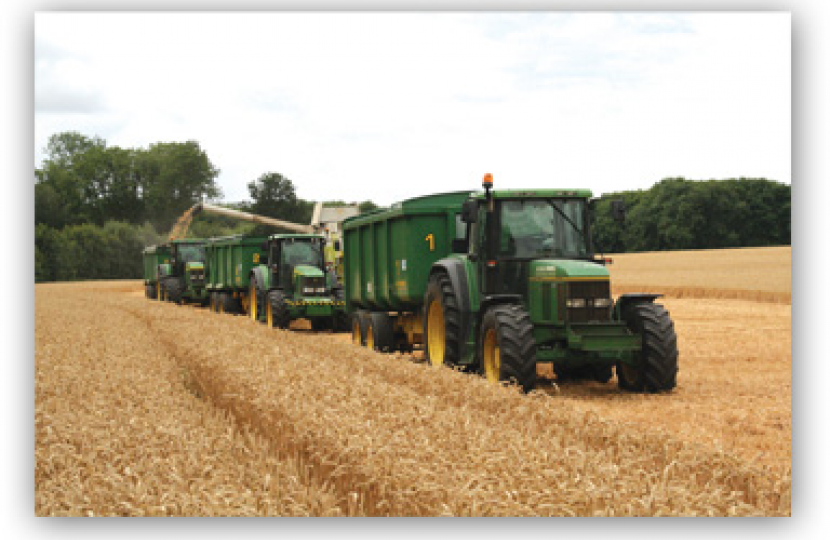
I wanted to provide concerned constituents with an update following the vote on the House of Lord’s proposed amendment to the Agriculture Bill on Monday (12th October). As the MP for Mid-Sussex, where farming is such an important part of local life, I completely understand the potential reservations constituents have about this legislation given the recent media speculation, but I really hope I can reassure you these fears are misplaced.
The Minister for Farming, Victoria Prentis MP, stated at the Despatch Box in the House of Commons this week the existing laws would safeguard the UK’s high food and animal welfare standards already in place, emphasising how these were "more use than warm words" in maintaining food standards, environmental protections and animal welfare. I would encourage constituents to read the full debate which took place before the vote on Monday which fully covers the matter: https://hansard.parliament.uk/Commons/2020-10-12/debates/23E1C827-D8C0-481D-9D97-40920456BBB4/AgricultureBill?highlight=victoria%20prentis#contribution-A77DC2F9-4FDF-4B76-B98D-93D87AAE9CD1
British farmers need stability and certainty, which is exactly what this Bill will deliver. This was highlighted during my meeting with representatives of the NFU. With its focus on supporting productivity, this Government’s Bill will help the sector realise the ambition we all share of growing more, selling more and exporting more great British food. Food and farming are the bedrock of our economy and environment, generating £112 billion a year, helping to shape some of our finest natural habitats and landscapes. I am delighted this Government will continue to commit the same cash total in funds for farm support until the end of this Parliament.
Regarding any proposed amendments in this bill, the Farming Minister previously made it clear in the House of Commons chamber back in May that introducing further legislation changes and amendments however ‘well-meaning’, designed to safeguard import standards in future trade deals would, in her words ‘significantly disrupt’ food supplies as they are. She went on to say it was in her view these clauses would affect UK exports to countries with whom, as part of the EU, we currently have suitable trade agreements, which would jeopardise potential continuity agreements. The link to this debate is as follows: https://hansard.parliament.uk/commons/2020-05-13/debates/D4889925-5B63-498E-BC68-BFCF91691C66/AgricultureBill
This Bill will lay the crucial groundwork for a British agricultural policy which will stand the test of time. The opportunity to leave the Common Agricultural Policy behind and move towards a brighter future for farming is one of the chief benefits of Brexit and this Bill will make this future a reality. It will allow us to create an agricultural system which rewards farmers and land managers who protect our environment, acting as nature’s stewards to leave behind a cleaner, healthier legacy for future generations.
I have been in touch with the Secretary of State for International Trade Liz Truss MP, and we have discussed at length future trade arrangements for our country, including the subject of Beef and Lamb exports to countries outside of the EU, including the USA, with the first exports to the USA getting underway last month. I also spoke to her at the APPG on the Wine’s of GB regarding supporting local suppliers in Sussex. This will have a vital, positive impact on our farming industry in the UK, through the trading opportunities provided by Brexit.
This Government is committed to our red lines – the NHS, the price it pays for drugs and its services are not for sale, and there will be no compromise on our high environmental protection, animal welfare and food standards – this was made clear in our manifesto. It is vital people across the UK have confidence in the food they eat, which is why I welcome this Government’s commitment to ensure all future trade deals live up to the values of our farmers and consumers. All food coming into this country will be required to meet existing import requirements. At the end of the transition period, the Withdrawal Act will convert all EU standards into domestic law.
The UK’s food standards, for both domestic production and imports, are overseen by the Food Standards Agency (FSA) and Food Standards Scotland (FSS). These are independent agencies and provide advice to the UK and Scottish governments. They will continue to do so in order to ensure that all food imports comply with the UK’s high safety standards. As such, there is no need to set up another Food Standards Commission, when the FSA has successfully fulfilled this role for decades.
Finally, I am pleased the Government are engaging with the agricultural sector as part of its trade discussions, including the National Farmers Union, whose local representatives I last engaged with last month. Additionally, the NFU’s president, Minette Batters, met with the Prime Minister this afternoon (14th October) to discuss the importance in safeguarding British farming standards in future trade deals. My fellow Ministers share my determination to ensure our future trade agreements will deliver benefits for our brilliant farmers and food producers.
I hope this was useful and has reassured you.
